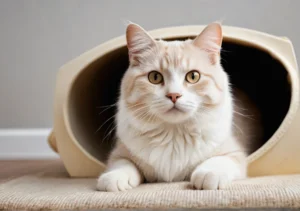Cats are intriguing creatures, often displaying behaviors that leave us wondering what’s going on in their furry little heads. One such behavior that can be both adorable and puzzling is when a cat hunches its neck. It’s a common sight among our feline friends, but have you ever stopped to think about why they do it?
Have you ever noticed your cat hunching its neck and wondered what it means? Let’s explore the reasons behind this curious behavior.
Natural Instincts
Cats’ tendency to hunch their necks can be traced back to their natural instincts. In the wild, wild cats would hunch their necks to protect their vulnerable throat area from potential predators. By lowering their heads and hunching their necks, cats were able to shield this sensitive area, staying alert and ready to react quickly to any threats that may arise. This behavior allowed them to enhance their survival chances in the wild by being constantly prepared to defend themselves.
Communication Signals
A cat’s body language serves as a powerful form of communication, both with other cats and with humans. When a cat hunches its neck, it may be conveying various communication signals. For instance, neck hunching can signal submission or a desire to avoid conflict. It can also indicate fear, discomfort, or stress in certain situations. As cat owners, it’s essential to pay attention to our feline friends’ body language, including neck hunching, to better understand their feelings and needs. By being attuned to these subtle cues, we can strengthen our bond with our cats and provide them with the care and support they require.
Additional Insight: Health Concerns
In some cases, a cat hunching its neck may be a sign of underlying health issues that need attention. Health concerns such as neck pain, muscle stiffness, or spinal problems could be causing your cat to exhibit this behavior. If you notice your cat frequently hunching its neck or displaying other concerning symptoms, it’s crucial to consult with a veterinarian promptly. Early detection and treatment of potential health issues can help ensure your cat’s well-being and quality of life.
Health Considerations
Does your cat often hunch its neck? It’s essential to pay close attention to this behavior as it could be a sign of underlying health issues. Neck hunching in cats can sometimes indicate pain or discomfort in the neck area or even a more serious medical condition. Keep an eye out for other signs of distress such as limping, loss of appetite, or changes in behavior. If you notice any concerning symptoms, don’t hesitate to consult your veterinarian for a thorough evaluation.
Stretching and Flexibility
Have you ever wondered why your cat occasionally hunches its neck? One possible explanation could be that neck hunching is a form of stretching or maintaining flexibility for your feline friend’s spine and neck muscles. Cats are known for their graceful movements and agility, and stretching plays a crucial role in keeping their muscles limber and healthy. Next time you catch your cat hunching its neck, remember that it could simply be their way of staying nimble and flexible.
Additional Unique Insight or Angle:
- Cats are natural contortionists and have the incredible ability to twist and turn their bodies in ways that seem impossible. This flexibility is not only impressive but also essential for their overall well-being. By incorporating regular stretching into their daily routine, cats can maintain their agility and prevent stiffness in their muscles and joints. Keep encouraging your feline friend to stretch and move freely to support their flexibility and health.
Stress and Anxiety
If you notice your cat hunching its neck, it could be a sign of stress or anxiety. Cats, like us, can exhibit physical symptoms of mental discomfort. Common stressors for cats include changes in their environment, loud noises, or even a new pet in the household. To help your feline friend feel more secure, create a calm and safe space for them to retreat to when they feel overwhelmed. Providing hiding spots, vertical spaces like cat trees, and interactive toys can help reduce stress levels. If the behavior persists, consider consulting with your veterinarian to explore further solutions.
Play Behavior
Seeing your cat hunching its neck during playtime could actually be a sign of excitement or playful behavior. Cats are known for their quirky antics, and neck hunching might be their way of expressing joy or engaging in a fun activity. During these moments, observe your cat’s body language for other signs of playfulness like dilated pupils or a twitching tail. Encouraging interactive play with toys like feather wands or laser pointers can channel their energy in a positive way. Remember, every cat is unique, so pay attention to their individual preferences and adapt playtime accordingly.
Additional Unique Insight:
– Cats may also hunch their necks during hunting behavior, mimicking the crouch they would use in the wild to stalk prey. This behavior is instinctual and allows them to focus their attention on their “target.” Provide opportunities for your cat to engage in hunting-like activities by using puzzle feeders or hiding treats around the house to satisfy their natural instincts.
Unique Facts About Cat Behavior
Did you know that cats hunch their necks not only as a sign of aggression or fear, but also to stretch out their spines and relieve tension? This quirky behavior is actually a natural instinct in felines, helping them stay limber and agile. So, the next time you see your cat hunching its neck, know that it’s just trying to stay flexible and healthy!
Understanding the Root Causes
When it comes to why a cat hunches its neck, it can be due to various reasons. These may include feeling threatened, experiencing pain or discomfort, displaying dominance, or even preparing for a potential attack. It’s important to observe your cat’s body language and overall behavior to better understand the specific trigger for this neck hunching stance.
The Role of Stress and Anxiety
Besides physical reasons, cats may also hunch their necks as a response to stress or anxiety. Just like humans, felines can experience anxiety and may exhibit certain behaviors, such as neck hunching, as a coping mechanism. Providing a calm and safe environment for your cat can help alleviate these feelings and reduce the likelihood of this behavior. Don’t forget to give your furry friend some extra love and attention during times of stress!
Additional Insight: Not all neck hunching is negative. In some cases, cats may also hunch their necks as a sign of contentment or relaxation. It’s essential to consider the overall context and body language of your cat to accurately interpret this behavior.
Alex, a passionate animal lover, has experience in training and understanding animal behavior. As a proud pet parent to two dogs and three cats, he founded AnimalReport.net to share insights from animal experts and expand his knowledge of the animal kingdom.




